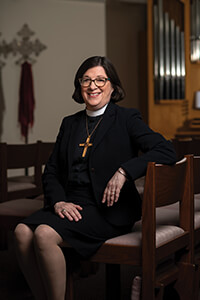We are woven together
September 2, 2022
He was a young man. In his early 20s. He had cancer. His mother and stepfather cared for him to the point of weariness. The family was unchurched, but a friend was a member of our parish and asked if I could visit them. That’s how I came to walk with them in the last months.
There were hospitalizations and finally palliative care. The young man endured with stoic courage. His mother and stepfather never waivered in their care. Friends supported the family by bringing meals and sometimes just sitting in silence with them. At last, the call I knew was coming came. The young man had died.
I drove to the farmhouse past the cemetery where he would be buried. When I arrived the stepfather opened the door and motioned me to the living room. The young man had died in his mother’s arms. He had stopped shaving some weeks before, so his beard had grown in. Mother cradling the body of her dead son. It was a modern-day pietà.
In my time with the family, I found out that the stepfather was not baptized. I’ll call him Jim. We had many talks sitting at the wooden kitchen table—some profound, some less so.
And Jim had questions: not so much why this had happened to his stepson, but where was God? Where was hope? He knew his wife and son had been baptized. Jim wanted to know what that meant, what difference it made.
I answered that God was with Jim’s stepson in his pain. I explained that baptism was the gift of life that brought forgiveness, that baptism made us part of the body of Christ, the church, and that baptism made those who had been strangers from God and each other part of the same family. I told him that baptism was an unbreakable relationship between God and God’s people because God loves us and doesn’t want to lose a single one of us, that not even death can separate us from God’s love.
There is no room to dissolve the bond of baptism.
Jim asked to be baptized. He came to the realization that, as it has been said, water really is thicker than blood. Baptism doesn’t guarantee a life without struggle or hardship, but it makes us part of the one who suffered, died and was buried—and who, through that suffering and death, defeated death. So, at that wooden kitchen table with a stainless steel mixing bowl filled with water, Jim was baptized into Christ.
“Do you not know that all of us who have been baptized into Christ Jesus were baptized into his death? Therefore we have been buried with him by baptism into death, so that, just as Christ was raised from the dead by the glory of the Father, so we too might walk in newness of life. For if we have been united with him in a death like his, we will certainly be united with him in a resurrection like his” (Romans 6:3-5).
We have been through a difficult season in our country and our church. I’m not sure if we will ever completely understand the effects of the pandemic’s stress on all of us. The pandemic laid bare racial inequities and disparities in access to medical care, housing, employment and law enforcement. Civic discourse has become coarse and mean. Life is seen as a zero-sum game—if your side gets something then mine loses out.
This is also played out in the church. Of course there is room for debate and disagreement, there is room to call out one part of the church when it has hurt another. There is even room for justified anger. But there is no room to dissolve the bond of baptism. It isn’t even possible. In Christ we are individually members one of another. Sometimes we might feel like we are stuck with each other. This is the great mystery and beauty of the wounded body of Christ—we are woven together. Praise the One who makes us one.


